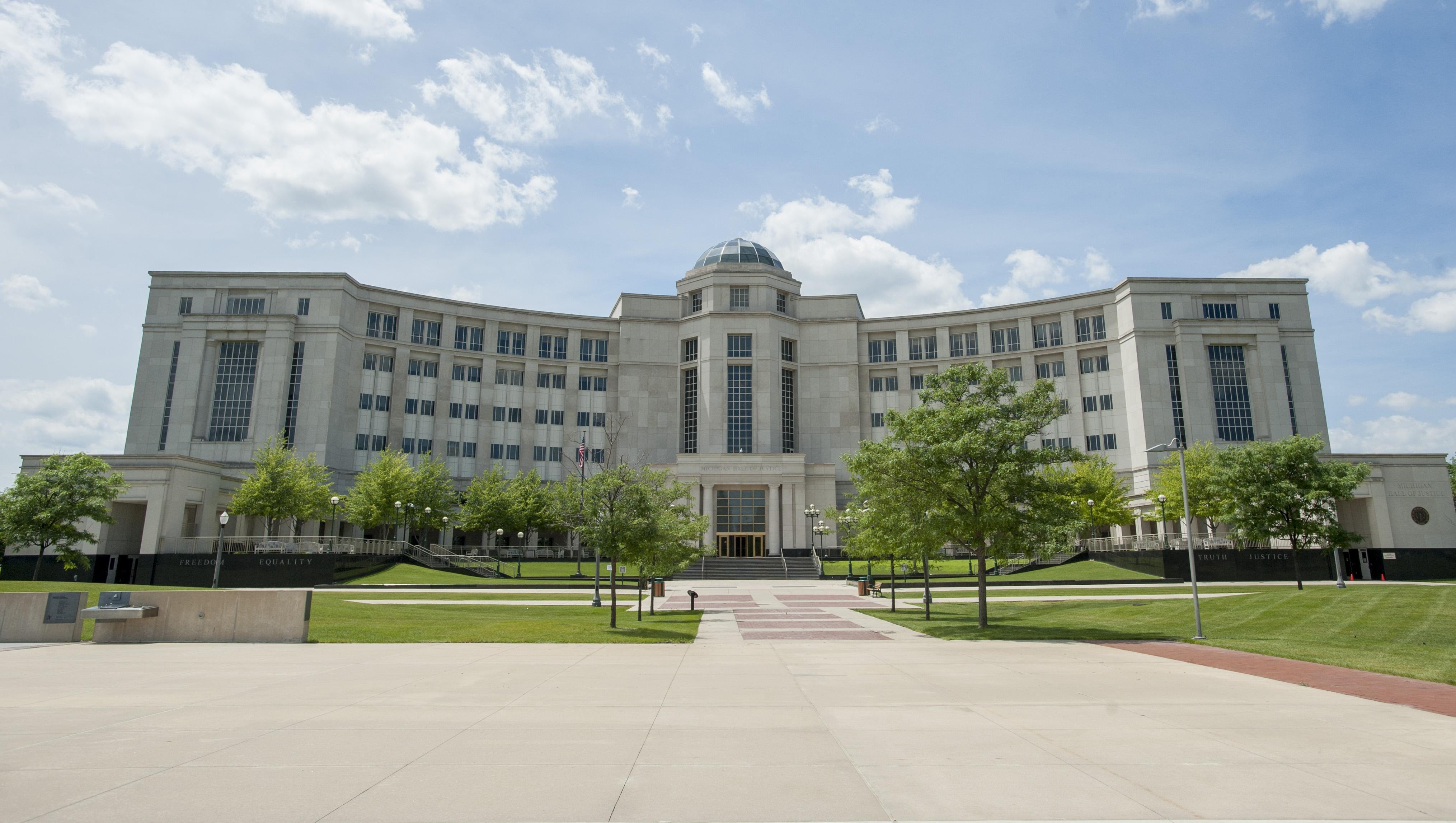GOP justices weigh fate of redistricting plan
 Jonathan Oosting
Jonathan Oosting
Lansing — The Michigan Supreme Court's Republican majority may decide the fate of a proposal that could dismantle political map-making rules that critics argue the GOP has manipulated to keep and grow power in Lansing and Washington, D.C.
The state’s highest court on Wednesday will hear oral arguments in a lawsuit seeking to keep the Voters Not Politicians proposal off the November ballot, effectively squashing an attempt to create an independent redistricting commission.
The case is fraught with political implications in Michigan, where Republicans wrote the current political maps in 2011 and could do so again in 2021 if they retain control of the state Legislature.
Democrats aren’t formally endorsing the proposal but regularly complain about alleged GOP “gerrymandering,” and the state party’s former chairman is the lead attorney in a separate federal lawsuit challenging the fairness of the current maps.
The suit to keep the independent commission proposal off the ballot is backed by the Michigan Chamber of Commerce, which has helped steer GOP redistricting efforts for nearly three decades and has contributed to all five Republican-nominated justices poised to hear the case.
“These justices are in a very difficult spot,” said Craig Mauger, a watchdog with the Michigan Campaign Finance Network. “Our judiciary is held up to be independent, but in this case, there’s a lot of outside influences.”
The legal challenge hinges on technical — not political — arguments. At issue is whether the proposal, which would add more than 3,000 words to the Michigan Constitution and change or strike 11 separate sections, is too broad to be considered a simple amendment.
Attorneys for the chamber-backed Citizens Protecting Michigan’s Constitution argue the proposal is so expansive it constitutes a full-fledged revision, which could only be achieved through a constitutional convention, not a ballot initiative. A Michigan Court of Appeals panel rejected the argument, but the group appealed.
Ballot committee attorneys note there is no prohibition on complex proposals and contend theirs is focused on the narrow objective of creating a new mechanism for drawing legislative and congressional maps.
“I think there’s solid constitutional and legal arguments to be made by both sides,” said Bill Ballenger, a former Republican state lawmaker who now writes the Ballenger Report. “But beyond that, the politics of it are fascinating.”
Under current Michigan law, whichever party holds power in Lansing at the start of a decade can control redistricting, a process ballot proposal backers say gives parties an avenue to draw districts for political gain.
Republicans who drew the current boundaries have publicly denied any overt bias and say existing laws already limit manipulation. But emails between map makers that were disclosed last week as part of the federal lawsuit point to political calculus.
In a May 2011 exchange, then-Michigan Chamber legal counsel Bob LaBrant told a legislative aide to then-Congressman Dave Camp, R-Midland, that Republicans would "accommodate whatever Dave wants in his district."
"We've spent a lot of time providing options to ensure we have a solid 9-5 delegation in 2012 and beyond," LaBrant wrote, referencing the congressional majority Michigan Republicans now enjoy.
Clement under pressure
The case could have major ramifications for Justice Beth Clement, said Ballenger, who noted the court's newest member recently made waves by siding with two Democrats and Republican-nominated Justice David Viviano in an unrelated case.
If she does so again and helps the redistricting commission proposal make the ballot, "there’s going to be hell to pay at the Republican State Convention” in August, he predicted.

Michigan is one of 10 states with overtly political processes for electing Supreme Court justices. While they appear on the non-partisan portion of the ballot, they are nominated at political party conventions.
Clement and Justice Kurtis Wilder are seeking re-election this fall after they were appointed to the bench by Republican Gov. Rick Snyder in 2017. They must first win nomination at the Michigan GOP convention in August.
Clement is also facing questions over potential conflicts. She voluntarily disclosed this past week that her campaign treasurer Mary Doster is married to one of the lead attorneys in the redistricting proposal challenge but said she does not believe the personal association will affect her decision-making.
An attorney for Voters Not Politicians told the court his group will not ask Clement to sit out the case after she reassured them that neither she nor her campaign has sought legal advice or counsel from Eric Doster, former general counsel for the Michigan Republican Party.
State records show Mary Doster is also listed as the campaign treasurer for Wilder, along with still-active committees for Viviano and GOP-nominated Justice Brian Zahra.
“We believe the Supreme Court will fairly review this matter and will come to the same conclusion as the bipartisan Michigan Court of Appeals panel: The pro-gerrymandering complaint has ‘no merit,'" said Elizabeth Battiste, a spokeswoman for Voters Not Politicians.
Clement previously served as Snyder’s chief legal counsel, and emails revealed in the federal suit — led by former Michigan Democratic Party Chairman Mark Brewer — show her assistant scheduled a June 2017 meeting with attorney Peter Ellsworth, LaBrant and other top GOP legal minds.
The topic: "redistricting."
The meeting was later canceled but was "to be rescheduled," according to a follow-up email from Ruth Thomet, an executive assistant who worked under Clement in Snyder’s office. It is not clear if the rescheduled meeting took place.
Snyder said last Thursday he has “the highest regard” for Clement.
The governor told The Detroit News he has not personally worked on any redistricting issue “in a long time” but said he is following the lawsuit now before the state Supreme Court.
“I think the ballot proposal language is very challenging,” Snyder said. “I’ve tried to read it. I’m a proud nerd, and I had difficulty understanding it.”
Chamber influence
The Michigan Chamber has played an active role in state redistricting efforts since 1989, when LaBrant helped create the Michigan Reapportionment Fund to pay for legal battles and help Republicans win majorities in Lansing.
The chamber is funding the legal challenge filed by Citizens Protecting Michigan’s Constitution. State records show the business group had contributed $85,000 to the committee through April 20 in the form of in-kind legal fees.
During the past 20 years, the chamber’s political action committee has also given a combined $124,534 in direct and in-kind contributions to the campaign committees of Republican justices who will hear the redistricting case, according to disclosure records.
The business group in February donated $15,000 each to Wilder and Clement, who are seeking election this fall. The Michigan Chamber PAC also contributed $10,000 to Zahra and $37,000 to Viviano for their winning campaigns in 2014 and 2016. It donated $30,250 to now-Chief Justice Steven Markman’s campaign in 2004.
President and CEO Rich Studley said the chamber is one of many groups that has exercised its right to support Supreme Court candidates, “not because they’re Democrats or Republicans, but do they believe and do they act to uphold the rule of law?"
The chamber’s board voted unanimously to oppose the potential ballot proposal because it is “bad public policy” that would diminish current powers for the legislative, gubernatorial and judicial branches, and prohibit citizen referendums on future political maps, Studley said.
“We aren’t in favor of gerrymandering, that’s silly,” Studley added. “What we want is a fair and open process that isn’t run by a partisan secretary of state” who, under the proposal, would be tasked with mailing applications and then randomly selecting commission members from a pool of finalists.
Several organizers with Voters Not Politicians have donated to Democrats in past election cycles, but the group insists it is non-partisan and wants to curb political manipulation by any and all parties.
The committee boasts support from former Michigan U.S. Rep. Joe Schwarz and former California Gov. Arnold Schwarzenegger, who both served as Republicans but have since clashed with the party.
The chamber is also one of the state’s biggest spenders on Supreme Court television ads, according to data tracked by the Michigan Campaign Finance Network. The business group spent an estimated $1.5 million on 2016 ads promoting the re-election campaigns of Viviano and former Justice Joan Larsen, now serving on the 6th Circuit U.S. Court of Appeals.
"And now it's up to the judges to have to sit there and make a decision," Mauger said. "They'll say we'll just do whatever the law says we should, but I think the public should be aware of all these connections."
joosting@detroitnews.com
(517) 371-3662
Twitter: @jonathanoosting